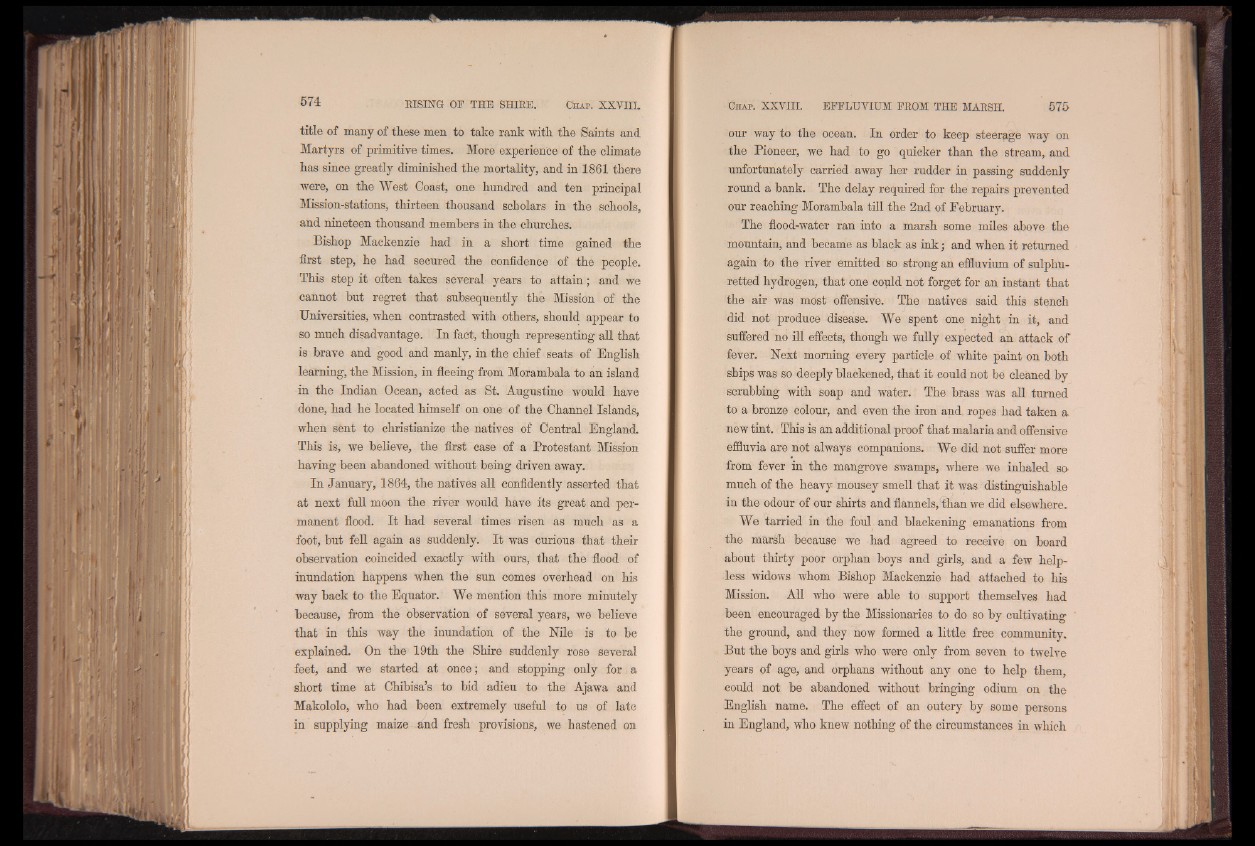
title of many of these men to take rank with the Saints and
Martyrs of primitive times. More experience of the climate
has since greatly diminished the mortality, and in 1861 there
were, on the West Coast, one hundred and ten principal
Mission-stations, thirteen thousand scholars in the schools,
and nineteen thousand members in the churches.
Bishop Mackenzie had in a short time gained the
first step, he had secured the confidence of the people.
This step it often takes several years to a tta in ; and we
cannot but regret that subsequently the Mission of the
Universities, when contrasted with others, should appear to
so much disadvantage. In fact, though representing all that
is brave and good and manly, in the chief seats of English
learning, the Mission, in fleeing from Morambala to an island
in the Indian Ocean, acted as St. Augustine would have
done, had he located himself on one of the Channel Islands,
when sent to christianize the natives of Central England.
This is, we believe, the first case of a Protestant Mission
having been abandoned without being driven away.
In January, 1864, the natives all confidently asserted that
at next full moon the river would have its great and permanent
flood. It had several times risen as much as a
foot, but fell again as suddenly. I t was curious that their
observation coincided exactly with ours, that the flood of
inundation happens when the sun comes overhead on his
way back to the Equator. We mention this more minutely
because, from the observation of several years, we believe
that in this way the inundation of the Nile is to be
explained. On the 19th the Shire suddenly rose several
feet, and we started at once; and stopping only for a
short time at Chibisa’s to bid adieu to the Ajawa and
Makololo, who had been extremely useful to us of late
in supplying maize and fresh provisions, we hastened on
our way to the ocean. In order to keep steerage way on
the Pioneer, we had to go quicker than the stream, and
unfortunately carried away her rudder in passing suddenly
round a bank. The delay required for the repairs prevented
our reaching Morambala till the 2nd of February.
The flood-water ran into a marsh some miles above the
mountain, and became as black as ink; and when it returned
again to the river emitted so strong an effluvium of sulphuretted
hydrogen, that one could not forget for an instant that
the air was most offensive. The natives said this stench
did not produce disease. We spent one night in it, and
suffered no ill effects, though we fully expected an attack of
fever. Next morning every particle of white paint on both
ships was so deeply blackened, that it could not be cleaned by
scrubbing with soap and water. The brass was all turned
to a bronze colour, and even the iron and ropes had taken a
new tint. This is an additional proof that malaria and offensive
effluvia are not always companions. We did not suffer more
from fever in the mangrove swamps, where we inhaled so-
much of the heavy mousey smell that it was distinguishable
in the odour of our shirts and flannels, than we did elsewhere.
We tarried in the foul and blackening emanations from
the marsh because we had agreed to receive on board
about thirty poor orphan boys and girls, and a few helpless
widows whom Bishop Mackenzie had attached to his
Mission. All who were able to support themselves had
been encouraged by the Missionaries to do so by cultivating
the ground, and they now formed a little free community.
But the boys and girls who were only from seven to twelve
years of age, and orphans without any one to help them,
could not be abandoned without bringing odium on the
English name. The effect of an outcry by some persons
in England, who knew nothing of the circumstances in which